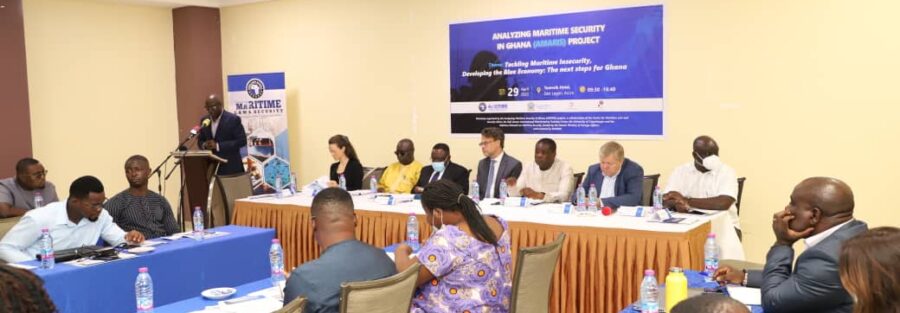Tackling maritime insecurity in order to enhance the blue economy, restore ocean health, but also to strengthen blue justice, continues to be one of the major challenges for today’s governments. Much attention is being paid to these ocean challenges in countries across the African continent.
For outside observers, Ghana has emerged as an African role model on what can be done to address maritime security. As a major port state, rich in offshore fossil resources, located in West Africa and part of the Gulf of Guinea region, Ghana has made significant efforts. It has also received substantial support from the international community and hosts important regional initiatives, such as the Regional Maritime University.
AMARIS meets Ghana’s maritime security community
The Analyzing Maritime Insecurity in Ghana project (AMARIS) has studied maritime security work in Ghana over the past two years. AMARIS is a collective research project carried out by the Center for Maritime Law and Security in Africa (CEMLAWS), the Kofi Annan International Peacekeeping Training Center (KAIPTC), the University of Ghana (UGhana), and University of Copenhagen (UCPH) in association with the SafeSeas network on maritime security. It is funded by the Danish Ministry of Foreign Affairs administered by DANIDA.
In April 2022, AMARIS discussed its key findings with Ghana’s maritime security community at an event held in Accra hosted by CEMLAWS. Representatives from over 20 organizations, governmental agencies, non-governmental organizations, and international donors participated. 24 speakers gave short presentations across four panels. Covered extensively by national news. the event raised attention for current challenges and the next steps Ghana should take. See the full program here.
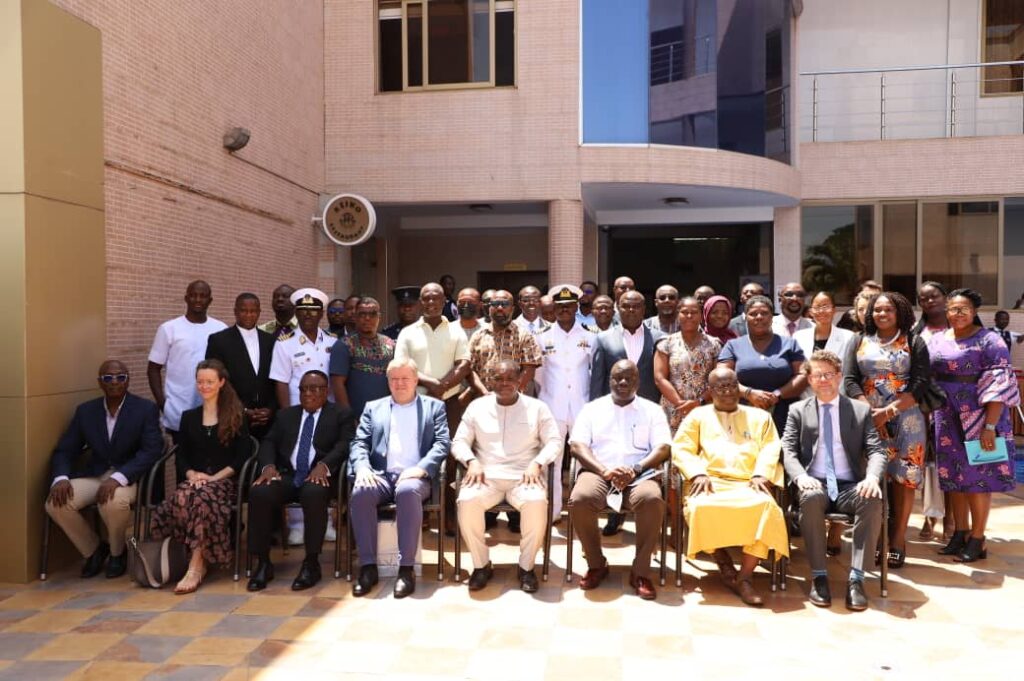
High level attention
The opening session featured welcome remarks from the organizers, Prof. Christian Bueger (UCPH&SafeSeas) and Dr. Kamal-Deen Ali (CEMLAWS), followed by introductory speeches by Antwi Akosa, Deputy Director General, Ghana Maritime Authority, Francis Ofori, Commandant of KAIPTC, the Danish Ambassador HE Tom Noerring, and Alban Bagbin, the Speaker of the Parliament of Ghana.
Speakers re-emphasized their strong commitment to address maritime security, flagged the different challenges that the maritime environment is facing, and highlighted that crucial steps are taken, such as the finalization of the National Integrated Maritime Strategy (known as NIMS).
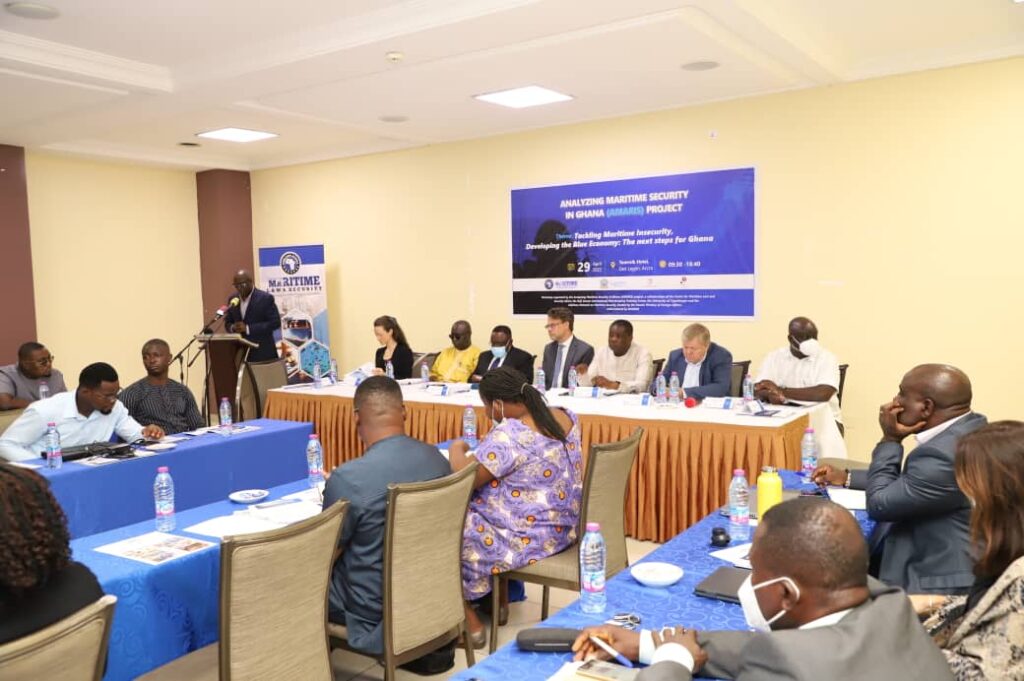
Threats and Challenges in Ghana’s maritime domain
The next panel, chaired by AMARIS member Prof. Kwesi Anning (KAIPTC) focused on threats and challenges in Ghana’s maritime domain. In the key note presentation, AMARIS researcher Dr. Anna Mensah provided an overview of the landscape of challenges Ghana has to cope with, drawing on AMARIS policy reports (available here).
Haruna Osman from the Narcotics Commission, Noemie Simon from the Environmental Justice Foundation, Charles Osei from the Marine Police, and Sam Ayelazono from the Ghana Navy gave short presentations on the main challenges they currently see.
Piracy often grabs the headlines, but the actual picture of crimes and illicit activities that need attention is much broader. Critical issues, such as illicit fishing or a wide ranger of smuggling activities need to be confronted. This became clear in Dr. Mensah’s presentation and also the panelists stressed the impact of different crimes.
As the panelists argued, more focus on the driving forces of criminal activities at sea is imperative. Greediness and poverty, lack of attention and information sharing, but also a culture of impunity drives illicit activities. The panel documented that maritime actors have different concerns, which often makes it difficult for the maritime security community to agree on shared priorities.
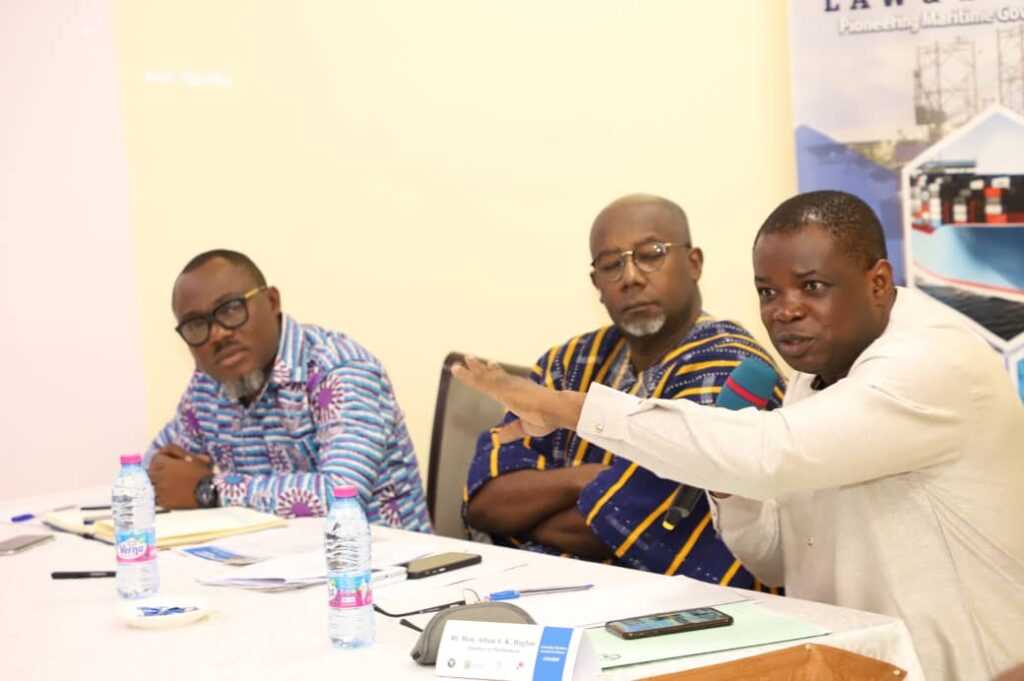
Effective maritime security governance
The next panel focused on maritime security governance and how to make it more effective. In his keynote presentation, Dr. Kamal-Deen Ali presented the key insights from AMARIS. Arguing for a wide understanding of governance that goes beyond legal procedures and emphasizes accountability and inclusivity, he elaborated on the complexity of the maritime security sector in Ghana, drawing on an AMARIS policy paper (available here). He called for more attention to this complexity and the need that each actor plays its part in a cooperative spirit.
Kwame Governs Agbodza, Member of Parliament, Francis Micah from the Ghana Ports and Harbours Authority, AMARIS member Prof. Ransford Gyampo from the University of Ghana and Emmanuel Ankamah from the Ghana Maritime Authority commented from the perspective of particular members of the maritime security community.
The panel flagged the importance of ensuring accountability in maritime security. In particular, the parliament needs to pays close attention to ongoing developments and muster the necessary political will. The quality of law enforcement depends on solid legislations as much as effective budgeting.
Panelist highlighted the dangers of turf wars between the agencies. Competition over authority, responsibility and resources might undermine efficacy. The National Integrated Maritime Strategy (NIMS) that is currently finalized provides a major opportunity for organizing governance better. It will allow agencies and other members of the maritime security community to find their role and work towards common objectives. All panelists called for lending strong support to the strategy.
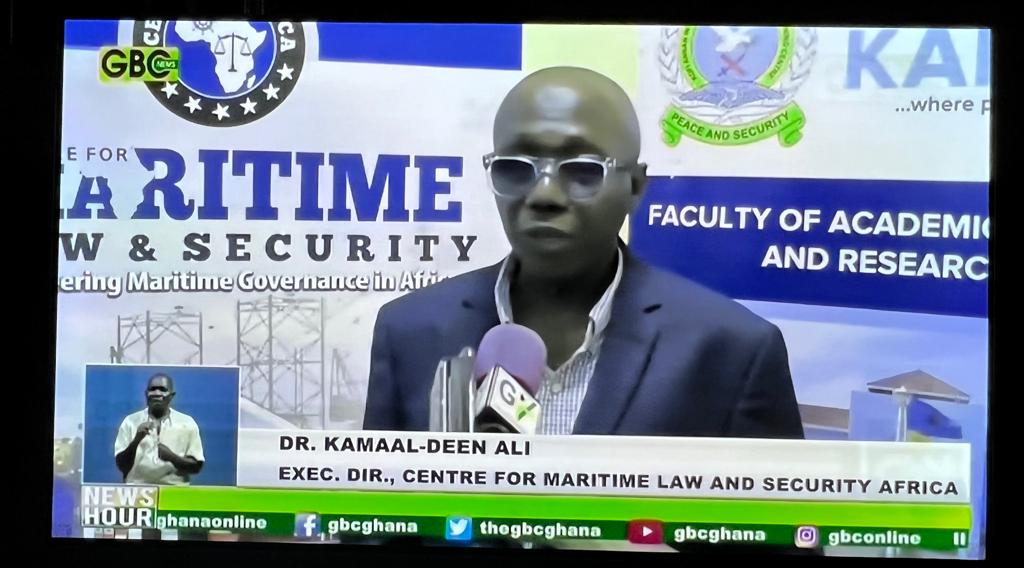
Towards effective capacity building
Like other countries on the African continent, also Ghana benefits from international capacity building assistance. To deliver on its ambitions, Ghana’s maritime security community needs expertise, training and resources that are often not yet available in the country. This was the focus of the third panel chaired by AMARIS member Dr. Emma Birikorang (KAIPTC).
Dr. Katja Lindskov Jacobsen (UCPH) gave the key note presentation drawing on the research of AMARIS in this area. She emphasized lack of attention for how the expertise, skills and resources developed in capacity building are used. Efficacy could be improved if this is better monitored and attention for potential cases of misuse is needed.
Dr. Eunice Konadu Asamoah from the University of Ghana, Harry Barnes from the Port Environment Network Africa, Prof. Nana Ofosu Boateng from the Regional Maritime University and Derrick Attachie from the Global Maritime Crime Programme of the UN Office on Drugs and Crime commented on the presentation.
Panelists agreed that the impact of capacity building can be strengthened. They encouraged bottom up thinking, concentrating efforts not only within state agencies but also civil society and paying more attention to the long term impact of working with local training and higher educational institutions. They also pointed to the dangers of duplication and miscoordination that a lack of transparency on capacity building might cause.
The next steps
The day was concluded with a summary of key points by the organizers. Dr. Ali Kamal-Deen and Prof. Christian Bueger emphasized the importance of a cooperative spirit within the maritime security community. They called for strong support for the NIMS and flagged that the strategy provides a major window of opportunity.
Bueger also outlined some of the emerging themes that did not receive much attention so far. Drawing on a forthcoming AMARIS policy report, he argued that Ghana’s maritime security debate must start to pay more attention to the impacts of climate change and how it will present new challenges for maritime law enforcement or might lead to new patterns of crime.
He argued for a better understanding of environmental crimes, beyond illicit fishing, that have the potential to harm marine life significantly. Also the protection of critical subsea infrastructures, such as subsea data cables vital for Ghana’s digital economy, must be placed higher on the agenda.
Source: https://www.safeseas.net/maritime-security-in-ghana-the-next-steps/





